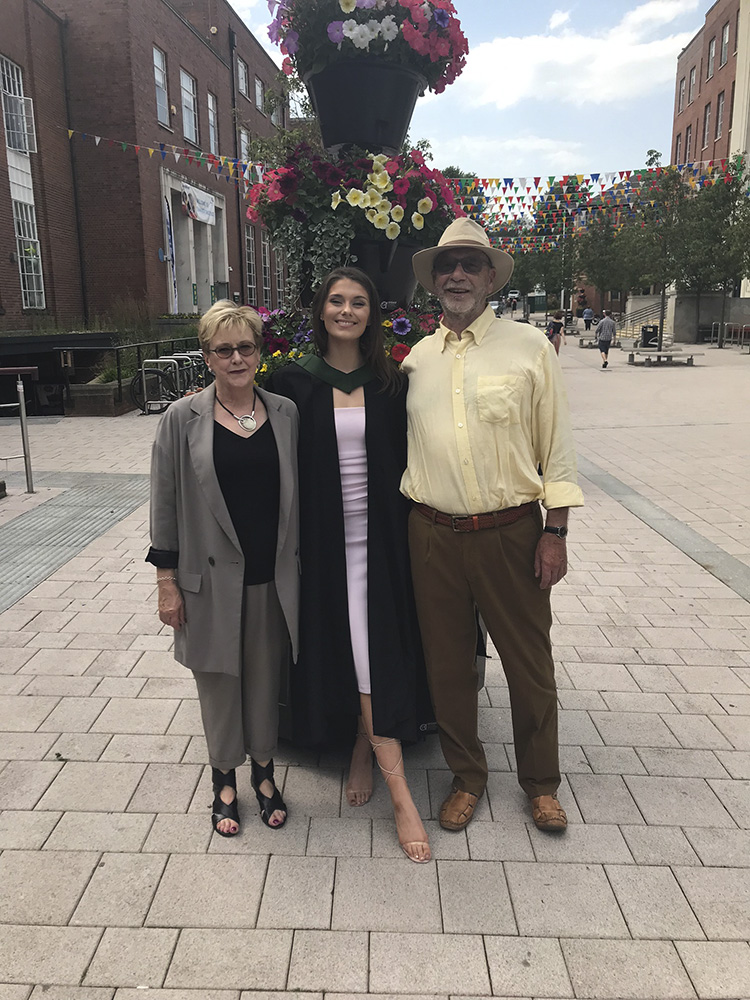“The truth is, with a terminal diagnosis, the day-to-day becomes un-normal.”
Megan Bishop shares her story of losing her Grandad & Uncle to this cruel disease.
When my Grandad was first diagnosed with Pancreatic Cancer, I knew I wanted to write about it.
Initially, I wanted to write him a letter or a collection of words to express how much he meant to me. He often wrote to the newspaper, sending in witty poems and responses to current affairs, and I wanted to honour him with a medium that he so effortlessly excelled in – well, at least to me; I don’t think the editors of The Times would necessarily agree.
However, something stopped me, a recurrent thought that what I needed to be was present and to behave as normal.
The truth is, with a terminal diagnosis, the day-to-day becomes unnormal.

When someone you love receives a ballpark figure of how long they have to live, a glance to check the time becomes accompanied by a quick check to see if you have missed a phone call…THE phone call.
Living 4 hours away, each train journey after the diagnosis went from being a chance to watch Netflix or read to me plotting the right way to say hello and goodbye. I would sit there and carefully think of ways to ensure my intonation wouldn’t reveal how scared/angry I was that this was happening.
Prior to my Grandad’s diagnosis, we had lost our Uncle to the disease. A ridiculously smart and enigmatic man; who within a matter of months went from being the life of the party to holding his own seminal art show and leaving his legacy via his artwork and my two cousins. The quickness of Paul’s death lingered in my head throughout each stage of my Grandad’s journey – although, we were lucky to have an extra year with him.
Cancer is a cruel disease - so be kind to yourself and others around you. Some days, you will sit on the floor and cry. Other days, you will laugh and dance and forget momentarily.
There is nothing I can say or write to prepare you for dealing with a stage 4 pancreatic diagnosis. The truth is, the people around you will become unrecognisable: not just your loved ones but yourself.
Cancer is a cruel disease – so be kind to yourself and others around you. Some days, you will sit on the floor and cry. Other days, you will laugh and dance and forget momentarily. In the same way that there is no specific prescription for pancreatic cancer at this stage, there is no one-size-fits-all approach to how to behave at this time.
My other top tip is do not google things when you’re upset, you will only end up thinking the worst.
So instead of sending him words that whilst filled with meaning, wouldn’t have meant much to him, I hope this piece helps someone understand they’re not alone.
I spent a large proportion of my last year with my Grandad feeling angry, confused and lost, struggling to comprehend our families’ new reality. It’s been just over 6 months since he passed. Yes, at times I feel angry, confused and a little lost, but overwhelmingly, I feel relieved.
Whilst I never wrote to my Grandad, I hope I got to show him how much he inspired me, and I adored him. Despite being highly intelligent, he wasn’t a man of many words, he showed his love through his generosity and kindness. So instead of sending him words that whilst filled with meaning, wouldn’t have meant much to him, I hope this piece helps someone understand they’re not alone. Grief isn’t a linear experience, and the unpredictability of pancreatic cancer can make you feel isolated in a completely new way.